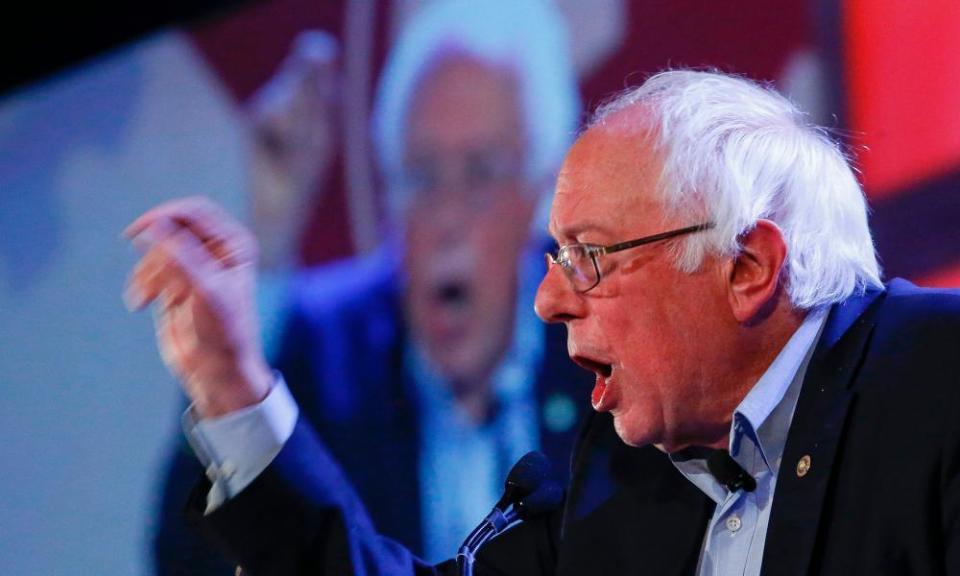The Bernie Sanders-wing scares Democrats. But they'll lose without it | Ross Barkan
If the Democrats want to build a serious, dominant party, they must proffer more than Clinton-era platitudes and neoliberal gut-punches

The newest idea circulating among the very smart people who report and commentate on American politics is that the Democratic party, so enfeebled in the age of Donald Trump, might be in danger of veering too far left. While Bernie Sanders tries to foment his revolution across the country, many Democratic elected officials and operatives are wary that candidates too steeped in socialism will blow it in the more moderate and conservative-seeming precincts of the country. They point to the losses of Sanders-backed candidates, fretting that the party’s fiery wing will burn away the real voters they need.
For most Democrats aligned with the establishment, the dream is Jon Ossoff. A 30-year-old first-time candidate running in a special election for a suburban Georgia congressional district once held by Trump’s Health and Human Services secretary, Tom Price, Ossoff has shattered fundraising records and holds leads in the polls over his Republican opponent.
Once viewed a long shot, Ossoff has a real chance of winning on 20 June. Though he’s raising cash like a Sanders clone, his politics are well to the right. He has said he will never support single-payer healthcare or raising taxes. His campaign messaging is rather milquetoast: he promises, as a political outsider, to go against the grain in Washington.
Nine times out of ten, anyone who says they’ll be an independent in DC gets swallowed up by the swamp soon enough. Maybe Ossoff is different. What he represents, however, is a seeming compromise between the two paths offered up for Democrats – a way to raise gobs of money from the grassroots without stumping on the issues that could alienate the party’s influential donors and power brokers.
The danger for Democrats, however, is thinking Ossoff-like candidates – moderates with poll-tested prescriptions – point the easy path forward. Liberals of all stripes, desperate for ways to resist the Trump presidency, are pouring their money and attention into a well-timed special election which may foreshadow an anti-Trump wave next year. The appeal of flipping a red district blue only amplifies that.
Party strategists are right to argue that candidates can’t be one-size-fits-all, ultra-leftists checking off every box for a Democratic purity test. But they must understand it is Sanders right now who is offering a viable path to resurrection. It is Sanders – though technically not a Democrat – who remains the most popular Democratic figure in America by far, a frontrunner for the 2020 nomination if he decides to run.
If he’s healthy, age is no barrier, because political rules like that don’t exist any more. Trump was older than Ronald Reagan when he took office and even his worst enemies couldn’t accuse him of seeming lethargic.
It’s the message, as always, that matters most. There may be a backlash against Trump-like candidates – slovenly, know-nothing celebrities – but a centrist revival is not exactly imminent. Hillary Clinton won the nomination in 2016 running far to the left of her former president husband, and she still proved insipid in the end because she offered no unified, compelling vision for the country, no real reason to vote for herself except as a vessel to stop Trump. As of now, that is the only plan for Democrats in 2018: we are not Trump, so put us in office.
In the short term, that might be enough. That’s how congressional elections, far more nationalized than they once were, work these days. But limiting the Democratic party to an anti-Trump wing obsessed with Russia promises little in long-term fruit.
Franklin Roosevelt made generations of Americans Democrats by creating the New Deal and showing even the country’s right wing that government can play the role of protector, guaranteeing dignity and safety for the most vulnerable. Sanders and his acolytes now carry that torch, fighting for a desperately-needed social safety net that other first-world democracies guaranteed to their citizens long ago.
Not every Sanders-backed candidate wins. That misses the point. If the Democrats want to build a serious, dominant party in the years to come, they must speak to the overwhelming anxieties of the working class and poor and proffer more than Clinton-era platitudes and neoliberal gut-punches.
Globalization, automation and the decline of organized labor has permanently eviscerated a crucial layer of the safety net already. To not have an answer to this suffering is to backslide further into irrelevance, which the Democrats already know something about.

